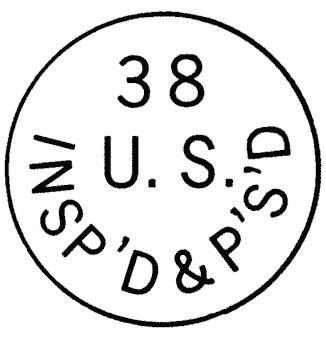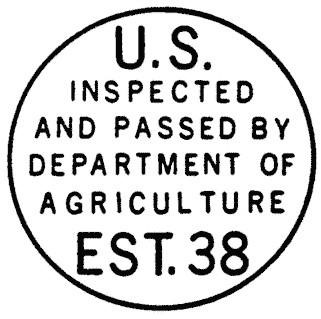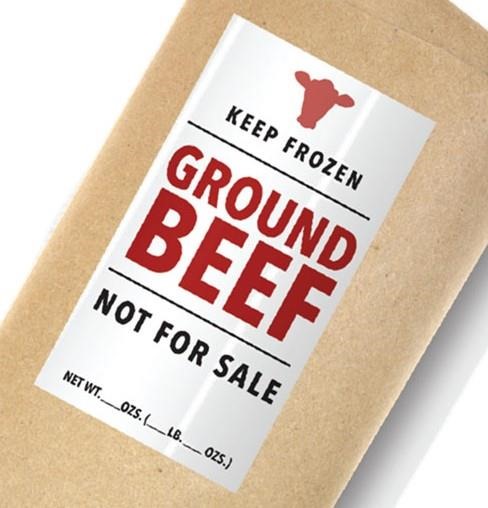As many Federal laws do, the Meat Inspection Act allows for an "exemption" to the requirement of inspection if (and only if) the meat derived from the live animal is not being sold and all of the meat processed from that animal's carcass is being returned back to the owner/s of the animal for consumption by themselves, their family, and any non‐paying guests. In other words, meat from domestic livestock not inspected by FSIS cannot be given away. This exemption is often referred to as "Custom" or "Custom Exempt". Meat derived from livestock that are custom slaughtered is not allowed to be sold, given away, or donated. In Pennsylvania, livestock slaughtered can be "Inspected" or "Custom". The term "custom" is where some of the confusion may come from. The cutting instructions for meat from any inspected carcass may be "customized" to the owner or purchaser's desires and be sold at various venues. Scenario 1 provides an example situation of how "inspected" carcasses may be "customized" for sale.
Scenario 1: Inspected
A sheep farm is taking meat from their lambs to sell at a local farmers' market. The owner of the lambs has them harvested at a USDA Inspected establishment and has each lamb carcass custom cut. Lambs 1 and 2 were cut into all boneless roasts and the trim made into ground lamb. Lambs 3 and 4 were made into bone‐in roasts and chops and the trim made into merguez sausages. Because the live lambs were harvested and inspected by FSIS, the meat from the carcasses can be sold as individual packages. But, each package must be labeled by the meat processor and have the "mark of inspection" present or logo that indicates the meat was
The Meat, Poultry, and Egg Product Inspection Directory can be found on the web.
Examples of USDA Mark of Inspection
These are examples of what these logos may look like either on a carcass or package of meat. The letters "EST" on the image to the right indicate where the lamb was processed, ESTablishment 38.

Inspection Stamp found on a carcass

Mark of Inspection on boxes and packaging
Scenario 2: Custom
A cattle farmer sells a young steer for $2,500.00 to 5 different individuals and provides each individual with a bill of sale for their respective portion of that live animal ($500). In this case, each individual purchased 20% of one animal. To make the experience of the purchase easier for the new owners, the farmer also adds a delivery fee of $125 to the purchase price of the animal and provides instructions to the custom exempt meat processor for how the meat from the steer should be divided. Each package of meat from that carcass is labeled and marked, "Not for Sale", and the meat is then returned back to each of the 5 owners of the steer for consumption by the family and any non‐paying guests. Meat from this steer cannot be sold, donated, or given away.

Package of Ground Beef marked "Not for Sale"
We have established rules and options for harvesting livestock, but what about the corner meat market or local grocery store in your town? These operations are considered by law as "retail exempt" and are licensed and inspected, at least annually, by the PA Department of Agriculture. This situation provides us with yet another scenario to consider. Meat sold at retail operations must also come from a USDA inspected source, but may be cut‐up and packaged or smoked, further processed, and then sold by a retail exempt facility that has a retail license registered with the PA Department of Agriculture. Because the inspected source of the meat is not being transported by the retailer, the meat can be cut and further processed at the retail exempt facility without the need to have the mark of USDA inspection. These "exempt" retail establishments are allowed to sell to local restaurants or hotels, provided the sales do not exceed the annual limit set each fiscal year by the Federal government. In 2020, that dollar amount was $79,200.00. Retail exemption cannot be applied to farmers market sales, simply because the retail license for these markets are mobile, and the law requires that each individual package have the logo or mark of inspection. This would also be true for individuals selling beef, pork, lamb, or goat by the pound or by the cut (or any other unit) from an on‐farm freezer or store. Regardless of the type of retail establishment, the Pennsylvania Department of Agriculture requires licensing for the different types of retail operations.
More information on retail licenses for butcher shops and farmer's markets.
PA Meat Processors Map
The PA Beef Working Group established research during the summer of 2021 to map and create a tool for both FSIS inspected and custom exempt meat processors in Pennsylvania. This group is comprised of individuals representing the PA Beef Council, the PA Department of Agriculture, The Center for Beef Excellence, The PA Cattlemen's Association, and Penn State Extension. This tool does not include retail facilities and was created to determine the slaughter capacity for cattle, hogs, sheep, and goats in Pennsylvania.
View the PA Meat Processors Map
Source : psu.edu